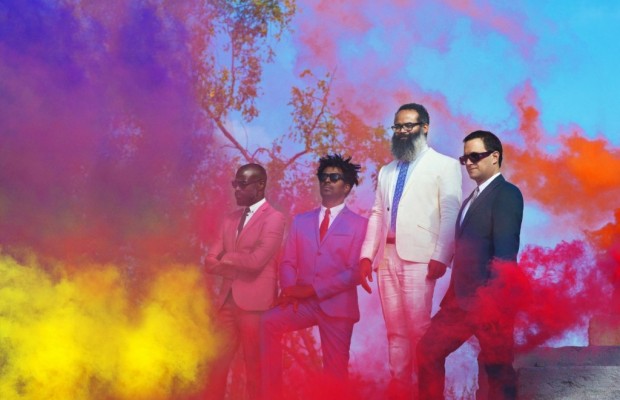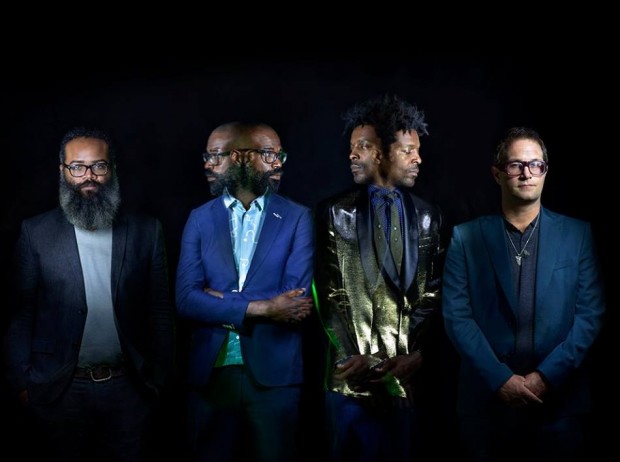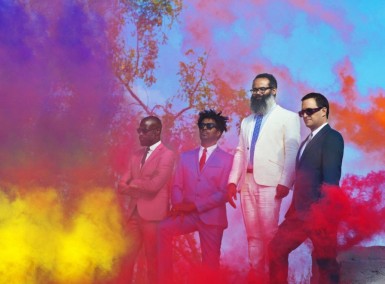
Seeds is TV ON THE RADIO The Radio’s highly anticipated sixth studio album. It’s their first album since 2011 and since the passing of bassist Gerard Smith. Following the release of one-off tracks Mercy and Million Miles in 2013 via member Dave Sitek’s label Federal Prism. Confident in the chemistry of the new dynamic, the art-rock mainstays started working on material for a new album. Less political and less challenging than the albums that got them the critical acclaim and recognition they deserved, Seeds still pulses with that jittery, restless energy that is so familiar of TV ON THE RADIO. The political agenda has been replaced with lyrics that are more personal, more anthemic. On an unseasonably sunny day in Berlin, we sit down with soft-spoken and humble Jaleel Bunton to chat about the social and cultural differences between New York and both L.A and Berlin, his hopes for the new album and what other musicians he’s currently listening to.
It’s an absolute pleasure to meet you. When did you get to Berlin?
I got here late last night from London.
And did you all recently move to L.A?
Two of us did, I’m kind of half way now. One foot somewhere in Kansas. We’ll see when I move.
But the album was recorded in L.A? How did the city influence it? Did you write ‘Nine Types of Light’ in LA too?
It’s funny, that album we wrote half in L.A, half in New York. David had just been out there for two months and moved his studio there. Tunde didn’t move to L.A until after we recorded this record, actually. It felt very different this time. I don’t know if you’ve been to L.A?
Yeah, a couple of times. Venice Beach and stuff. It’s strange; I guess the main way to describe it is the poverty divide. Coming from England where there’s free healthcare, it’s shocking to see people so vulnerable.
Venice has some of the most prized real estate in L.A; it’s really expensive. And right next to that is Malibu. But on the Boardwalk, you see where all of destitute drug-addicts are. California is weird like that. They allow people to exist… It’s very different but if you go to the Tenderloin district in San Francisco…
I used to live there… for six weeks, I was in-between flats…
Coming from New York people say that’s tough but… hmmm, the Tenderloin’s got its own speed. I was just talking to a friend; the Tenderloin is like Venice’s Boardwalk times twenty. Whereas the Boardwalk has some great aspects, the Tenderloin’s got nothing. It’s just skid row and the drug use is very open in the streets. The city just lets it exist that way, they don’t try to change it or help it, they just try to contain it. It’s just strange in the Boardwalk because its so wealthy.
I guess people just turn a blind eye…
Well, yeah… It used to be a similarity in New York but the city’s changed so much. No one knows what they did to the homeless people in New York. There are still some but when I was growing up there was a lot – much more like Venice, although not quite as much as the Tenderloin. Over the years, the 2000s, it got to be less and less and I don’t think that’s because the world got better. There’s rumors that they shipped people to California. But seeing that in New York, it’s scary so maybe it’s good that they let people stay…
I guess it gives soul to an otherwise pretty soulless place…
Again, yeah. Then there’s the whole idea that rich people have no soul.
I read an interview you did when you spoke about gentrification, which I found really interesting, as it’s a big issue here in Berlin. Artist areas versus expensive real estate being built, it’s like where do we go next… Like, this hotel here (the ‘nhow hotel’ on the Spree) used to be a squat and the other side of the river used to be full of Berlin clubs, ones that really contributed and shaped the city’s underground music scene, and they’ve all been torn down to build offices and tower blocks…
Demographically, who is the battle between? Artists and…?
It’s property developers and foreign real estate agencies because they can buy property so cheaply compared many European capital cities. It’s not really a poverty divide as such, it’s artists and investors…
It’s similar in New York but the investors are allowed to exist because there’s such a high demand or real estate. But who’s moving here?
I guess just people from other big cities where real estate is comparatively so much more expensive. It’s a lot of young people coming over and buying up the flats, too.
So do you feel like these young people are, I feel like I’m interviewing you guys (laughs) I’m just trying to break up the similarities. I was talking to a friend about this last night, because of people’s racial and social history, everything becomes related, you can never extricate race from finance. These people who are moving here, are they contributing to the culture or…?
In regards to the people we’re talking about now, I wouldn’t say they integrate themselves particularly well. They often don’t speak or learn German and build up these big expat communities. I guess, in that sense they’re bringing a new culture or a new social wave to the city. Also, statistically one in three people here is an artists so they’re here to reap the benefits of cheap living. It’s a very temporary city; people do their thing, the bohemian artist stint and then get out.
Then the competition comes into play – it’s interesting and completely boring to me at the same time. (laughs) In New York, everyone says that Berlin is what New York was 20 years ago. Honestly, walking around last night – I mean I’m not from here, I’m gullible and was impressed by almost everything. It seems nice but then I don’t know how full of shit everyone is. (laughs)
Have you been here before?
I have. And it really does remind me of New York twenty years ago, although I haven’t been here long enough to experience the real subtleties. This seems really dumb and trivial but it seems like this place really supports freedom. Like, for instance, you can have clubs that stay open for three days, you can smoke inside. It seems trivial but its not, it sends a message of the culture and the responsibilities you have living here. That’s on you. It used to be like that in NYC, it is funny watching the whole happen – they started cracking down on really simple things like the smoking ban, and there was a dancing ban.
I heard about that, it’s so ridiculous…
No one believes me in Europe but bouncers fully enforce it.
That would never, ever work here.
Yeah, and people in New York thought the same but it did happen because we’re all trying to survive. It’s not like they’d take you to jail for dancing, they’d fine the owner. They’d make the owner’s responsible and the bar in turn, is their business, it’s their life. It happened pretty quickly. The whole energy just changed, people got scared. You noticed that there wasn’t as much spontaneity in the world, as much music in the street, the city got more and more conservative. Oh, oyster bars and fancy cocktails!
When did this start?
In the late 90s, I’d say. Major Giuliani I think. I can’t really remember.
 Were you born and raised in New York?
Were you born and raised in New York?
No, none of us are originally from New York. I’m from Kentucky. Tunde is from Pittsburgh and Dave is from Baltimore. And we all moved there when we were twenty. Everyone’s like ‘band from Brooklyn’ and we’re like ‘Hmmm, no’ but… it does feel more like home than anywhere else. It’s great that you can have a city like Berlin where if people come and contribute to the city, that should be promoted.
I’m going to jump on that word, maybe we can spend a bit of time talking about the album…
Oh, yeah. I forgot (laughs)
Tunde’s said that the album 1000% the best thing you guys have ever done. Do you agree and feel that too?
I feel like it would be a complete lack of solidarity if I didn’t agree. I do agree. It’s a personal deficit of mine, I don’t know what authority figure slapped it out of me when I was a kid but it was like, ‘You will not be a bragger, you must keep a neutral tone.’
I can totally see that in terms of how you are as a band, you’re always very humble.
You should see all the selfies we have on Instagram (laughs) I mean, yeah, the record is really good. I can listen to it, which sounds really dumb but – not that I couldn’t listen to the others but sometimes its my own insecurity, I just don’t once its done. I don’t sit there and bathe in my own songs. But for whatever reason, I listened to this record quite a bit and it really works as a record. At the end of the day, it doesn’t really matter what I think – that’s what I’ve learnt in this whole thing. You make something and it’s good but once you release it, it doesn’t belong to you anymore. It’s like having a child; it goes out into the world and has relationships. Maybe you programmed it but now it lives its own life. The life it lives with other people, I love my child but now it belongs to other people so what they make of it is important.
And what do you think people will make of it? I know that you never try to re-create the same album twice, which is very true of this album, it’s very much its own sound.
Yeah, that’s true. You know, I have no idea how people will take on the album. Some who know our whole body of work will take it differently to people who’d never heard of the band.
I’d say it’s your catchiest and most accessible. I think it’ll reach a lot more people than your previous releases.
That would be great (laughs) I think you’re really right. In comparison to Desperate Youth, we’re just in a different place. People say that record’s really challenging (laughs) But I think music should be challenging. It can be a lot of things though, soothing etc. This new record though, doesn’t have those elements – it’s digestible. I hope that it doesn’t mean it’s boring. It’d be great if we go more fans, welcome.
I would say that the fans that you do already have are very dedicated, and that’s awesome.
Yeah, it’s great. I can’t tell you how lucky I feel to make music that I really believe in and its great that people are listening to that. If the price for being really rich is serving musical food that’s not healthy, I couldn’t stomach that. Pop music – just like pop food- is pop music for a reason. To think that I can make music that I think is valuable and give that to someone, music that’s authentic and can heal and that I can make a living from that, is very rare and I really respect that.
Do you ever get star-struck when you do collaborations with people? Didn’t you work with DAVID BOWIE?
Yeah, that was a long time ago. I don’t know; I get star-struck for weird reasons. The thing with BOWIE was amazing. But in my weird, arrogant, young mind I didn’t really register. He came into the studio one day, all like ‘What’s up, mate?’ and he was wearing trainers and asked us what he should do. It didn’t register until he started signing and then it was like ‘Oh wait, your voice lives in my brain, there’s a DAVID BOWIE room in my brain and it triggered something and whoa.’ And then I got really weird and couldn’t talk to him afterwards.
Any new artists you’re listening to at the moment?
Let’s see…. Hmmm. I’m really guilty of listening to five records in the past ten years. It’s Sam Cooke, it’s Nina Simone, what you gonna do, there’s not many other places to go. (laughs)
Are you familiar with the band YOUNG FATHERS?
No, but I am with the name. I’ve been hearing about them a bunch ‘cause of being in London. There’s some new hip-hop I like, like JONWAYNE. I think he’s fucking amazing. And some pop stuff, like I think KENDRICK LAMAR’s really good. And I finally listened to TAME IMPALA, which I think is really great too. I’m kinda in psych-vain, there’s a few OCs that aren’t new but they’re friends of ours and their new album is good. I like KING KRULE’s record. I really like parts of it and but then I’m like, I’m not ready to feel like this. (laughs) I feel like that too often, but I’m not ready to feel like that again, I love it but I can’t get deeper into it. It’s too good; it’s real. I was impressed that it became so popular, it’s a very specific thing. It doesn’t seem so glossy or easy and that he was received so well is great. Sometimes I get discouraged that the role is getting further and further away from human heartbeats – and then you hear something that’s exactly about that and people like it. If people are given dirty water, they’ll drink it but if they’re given both then they’ll drink clean water. People still really want that connection, they just take what’s out there and they gotta eat.
And lastly, what do hope and passion mean for you? It’s a difficult question to answer and I know we’ve not got much time left…
I guess it’s kind of everything. That’s exactly the kind of life I try to maintain. Hope and passion is the centerline of your life. Everything you do revolves around that, you spend your life fighting away things that pull you away from it. I guess that’s why I do everything so good name. And thank you, that was easy. (laughs)
—



